Related Research Articles
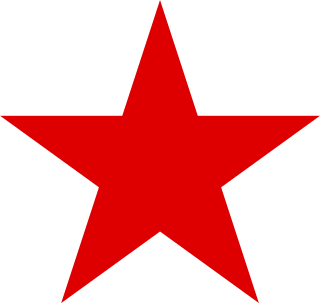
The Socialist Party of Indonesia was a political party in Indonesia from 1948 until 1960, when it was banned by President Sukarno.

The Republic of the United States of Indonesia Cabinet was established as a result of the formation of the United States of Indonesia following the transfer of sovereignty from the Dutch colonial power. It lasted less than a year before Indonesia became a unitary state.
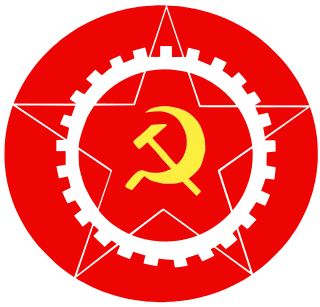
The Labour Party of Indonesia was a political party in Indonesia.

The Acoma Party was a communist party in Indonesia. It evolved out of the Young Communist Force. Acoma was converted into Partai Acoma on 8 August 1952. Acoma/Partai Acoma was led by Ibnu Parna.
Ibnu Parna was an Indonesian communist politician and leader of the Acoma Party, and trade unionist.

The Labour Party was a political party in Indonesia. It was formed on 25 December 1949 by a group of former Labour Party of Indonesia (PBI) members, who had disagreed with the merger of PBI into the Communist Party of Indonesia.
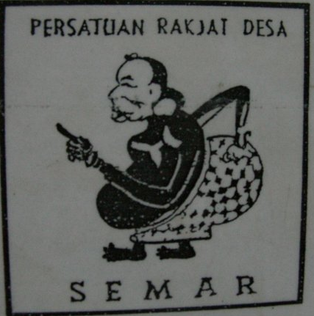
The Village People's Union was a political party in Indonesia. The party was based amongst the Sundanese population in West Java. In the 1955 parliamentary election, PRD got 77,919 votes. One parliamentarian was elected from the party. After the election the party joined the Fraction of Upholders of the Proclamation, a heterogenous parliamentary group with ten MPs.
The Islamic Victory Force was an Islamic political party in Indonesia. The party was based in Madura. In the 1955 parliamentary election, AKUI got 81,454 votes. One parliamentarian was elected from the party.

The Islamic Tharikah Unity Party was an Islamic political party in Indonesia. In the 1955 parliamentary election, PPTI got 85,131 votes. One parliamentarian was elected from the party.
The Indonesian Marhaen People's Union, generally known by its acronym Permai, was a social movement in Indonesia, functioning both as a political party and an Abangan mystical association. The organisation was founded on 17 December 1945. Permai was led and founded by Mei Kartawinata in Cimerta, Pasirkareumbi, Subang, Subang Regency with two friends, M. Rasyid and Sumitra. At its peak on 17 December 1945, It was declared as a political party with J.B. Assa, Iwa Kusumasumantri, Izaak Riwoe Lobo, and S. Karsono Werdojo.
The National Progressive Fraction was a parliamentary group in the Indonesian People's Representative Council, formed after the 1955 parliamentary election. The group consisted of ten Members of Parliament, all elected from Java.
The Fraction of Upholders of the Proclamation was a parliamentary group in the Indonesian People's Representative Council, formed after the 1955 parliamentary election. The group included ten Members of Parliament. The group was politically heterogenous, but was somewhat pro-Masjumi/Socialist Party of Indonesia.
The Development Fraction was a parliamentary group in the Indonesian People's Representative Council. It was formed after the 1955 parliamentary election, by seven independents elected on Communist Party of Indonesia tickets.

The National People's Party, initially founded as the Indonesian National Party–Independent, was a political party in Indonesia. It was founded on 23 July 1950 after a split within the Indonesian National Party (PNI). The divisions with the PNI had appeared at the party congress in May the same year, when Sidik Djojosukarto's followers had emerged victorious. Djody Gondokusumo was the chairman of the party.
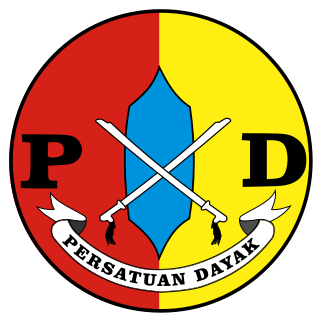
The Dayak Unity Party was a political party in Indonesia. Formed to represent 'primordial' interests of the Dayak people, the party was one few political parties in Indonesia at the time which was formed along ethnic lines. Oevaang Oeray, the first governor of West Kalimantan and one of the founders of the PPD, was a prominent leader of the party.
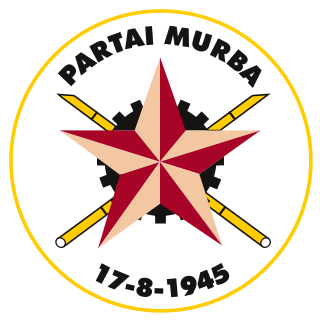
Murba Party was a 'national communist' political party in Indonesia. The party was founded by Tan Malaka, Chairul Saleh, Sukarni and Adam Malik in 1948. The history of the party was largely intertwined with that of the powerful Communist Party of Indonesia (PKI). Initially relations between PKI and the Murba Party were fluid, but gradually the two parties developed into each other's arch-enemies. The Murba Party continued to exist under the New Order, but was merged into the Indonesian Democratic Party in 1973.

The Indonesian Christian Party, better known as Parkindo, was a Christian political party active in Indonesia from 1950 until 1973, when it was merged to make the Indonesian Democratic Party.

The Times of Indonesia was a daily English newspaper published in Jakarta, Indonesia. Founded in 1952, it was the first English daily newspaper in Indonesia. The founding editor was Mochtar Lubis, who was also the editor of Indonesia Raya at the time. Mochtar Lubis had close links to the army leadership. In 1953, Lubis stepped down from his position due to the stresses of his simultaneous editorship of Indonesia Raya. Charles Tambu, from Ceylon, took over as managing editor of the newspaper.
The Great Indonesia Unity Party was an Indonesian political party established in 1948. It was founded by a group of dissenters who broke away from the Indonesian National Party (PNI) because of their dissatisfaction with the PNI's increasingly left-wing stance. Its chairman was Wongsonegoro, governor of Central Java. The party aimed to be based on neither religion like the Masjumi or a western political outlook. Initially known as the PNI-Merdeka (PNI-Independent) it subsequently changed its name to the Great Indonesia Unity Party.

Mohammad Sardjan was an Indonesian politician who served as Minister of Agriculture within the Wilopo and Burhanuddin Harahap Cabinets, in addition to being a member of the Central Indonesian National Committee, the People's Representative Council, and the Constitutional Assembly.
References
- ↑ Bertrand, Jacques. Nationalism and Ethnic Conflict in Indonesia . Cambridge Asia-Pacific studies. Cambridge, UK: Cambridge University Press, 2004. p. 229
- ↑ Feith, Herbert. The Decline of Constitutional Democracy in Indonesia . An Equinox classic Indonesia book. Jakarta [u.a.]: Equinox, 2007. p. 435
- ↑ Feith, Herbert. The Decline of Constitutional Democracy in Indonesia . An Equinox classic Indonesia book. Jakarta [u.a.]: Equinox, 2007. p. 472